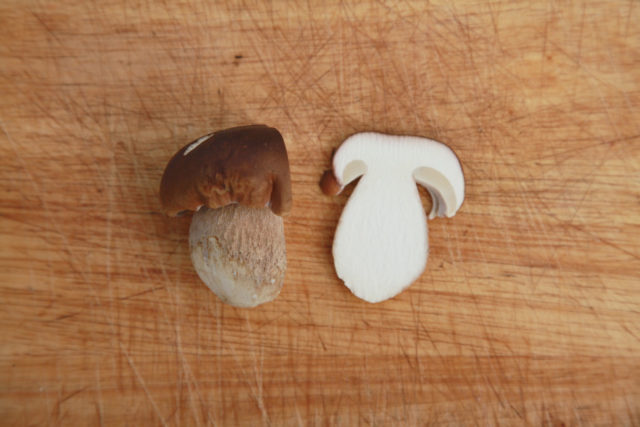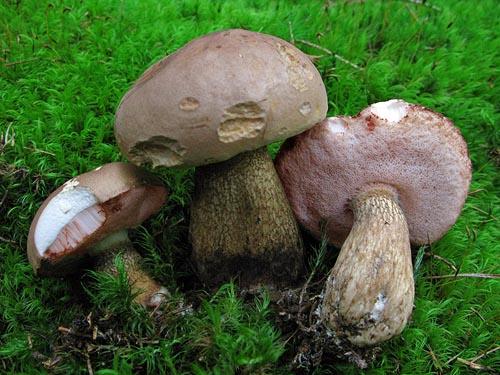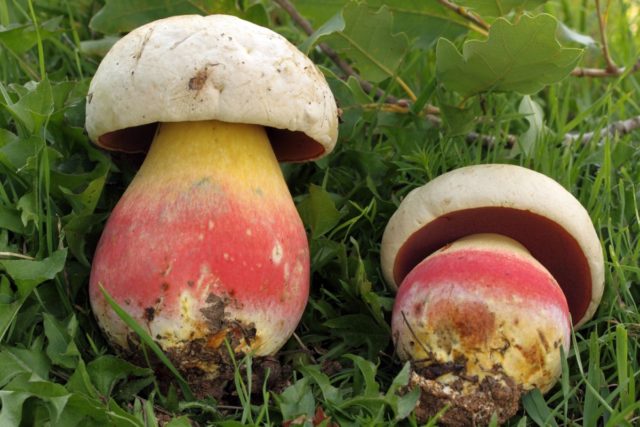Content
Borovik is especially popular due to its rich pleasant taste and aroma. It is widely used in cooking and medicine. Therefore, going into the forest, every lover of a quiet hunt tries to find it. But sometimes you can observe that the porcini mushroom turns pink, so you should know for sure whether you can use it in this case or it is better to abstain.

The fruiting body of the boletus does not turn pink on the cut
Does the porcini mushroom turn pink on the cut
This species got its name because its pulp has a light shade. Moreover, the color does not change upon contact with air. The cap of the porcini mushroom also does not turn pink when broken or cut. A light shade confirms the edibility of this representative.
Why does the porcini mushroom turn pink
The boletus has false counterparts that change color on the cut. There are certain signs that help to recognize such a representative. Therefore, if the porcini mushroom turns red or pink in the cut, then this feature should arouse suspicion. This shade is not the norm.
This sign indicates the content of toxic substances, so you should refrain from using such specimens. But this is not an absolute rule, since there are many edible species that also turn pink on the cut, but they are completely different from the porcini mushroom.
Is it possible to eat a porcini mushroom if it turns pink
If boletus turns pink during cooking, then it is better to refrain from eating it. Such an effect can be produced by an inedible twin, which changes its hue at elevated temperatures.
Moreover, you need to throw out all the copies that were in the pan. False boletus is distinguished by increased bitterness, which permeates everything that was nearby.
When collecting and cooking, you need to be extremely careful, since any suspicious specimen can cause severe intoxication of the body. If in doubt, check to see if the pulp changes color to pink on contact with air.
Other types of mushrooms, similar to white ones, that turn pink
There are several species that, in appearance, resemble a porcini mushroom and, after cooking, can turn pink. They are also able to change the shade of the pulp when cut or broken as a result of contact with air.
Gorchak (false porcini mushroom). Young specimens also have a convex cap, and when ripe, it straightens out. The diameter of the upper part reaches 10 cm, and the height of the leg is 7 cm. The fruiting body is distinguished by dense white flesh, but turns pink when cut. A characteristic difference is the dark brown mesh pattern on the leg. You can recognize the bitterness by the pink tint on the back of the cap in adult specimens. This double is poisonous, and because of the increased bitterness, it should not be eaten. Heat treatment only enhances this effect.
The pulp of the false porcini mushroom contains a high concentration of toxic substances that penetrate the bloodstream even with tactile contact. The first signs of food poisoning after consumption are dizziness, general weakness and nausea. They pass in a day. After a few weeks, problems with the separation of bile begin, which leads to disruption of the liver. With a large ingress of toxins into the body, cirrhosis may develop.

The spore layer in adult bittersweet turns pink as it ripens.
Bolette satanic. Even a small piece of it can provoke serious poisoning. The degree of toxicity can be judged by the name. This double has a similar cap with a boletus and a thickened leg. You can suspect a poisonous specimen by the characteristic roughness of the upper part, which is felt if you slide your finger. The cap color ranges from light gray to ocher.
The shade of the leg is yellow-red, and towards the middle it becomes carmine. On the cut, the fruit body has a light cream color, but upon contact with air it turns pink and blue. Adult specimens exude an unpleasant odor.

Bolet satanic is distinguished by a bright color of the fruit body
Knowing the distinctive features, it is possible to recognize inedible twins by external signs, and if in doubt, it is recommended to slightly break the pulp and make sure that it turns pink on contact with air.
Conclusion
If the porcini mushroom turns pink when cut, then you should not put it in the basket with the rest of the specimens, since the main feature of this species is the snow-white pulp, which does not change its shade both fresh and cooked.
Therefore, in order not to endanger your health, it is better to get rid of such a find. If, nevertheless, a false porcini mushroom got into a common pan and turned pink after cooking, then one should not hope that the high temperature will destroy the toxic components. On the contrary, their toxicity will only increase.








